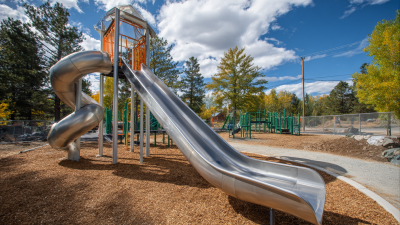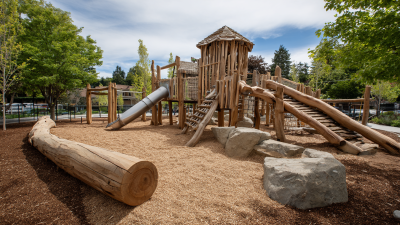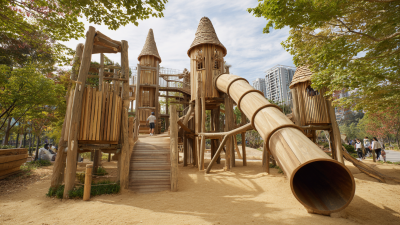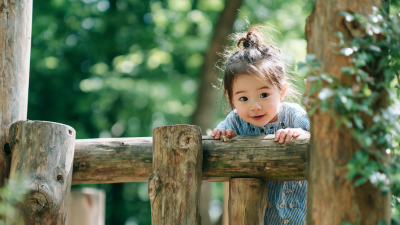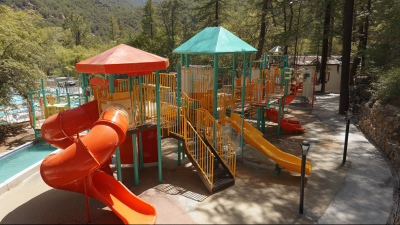 +86-13901441113
+86-13901441113




 Playing outdoors is essential for children’s development, and one of the best ways to encourage this is through Outdoor Play Sets. These versatile play structures not only provide a fun and engaging environment for kids but also contribute significantly to their physical, social, and cognitive development. By climbing, swinging, and exploring, children enhance their motor skills, build strength, and develop coordination. Moreover, Outdoor Play Sets foster social interactions as children learn to take turns, share, and cooperate with their peers during playtime. Furthermore, engaging with nature has been shown to positively impact mental health and promote imaginative play. In this blog, we will explore the numerous benefits of Outdoor Play Sets for children's development, highlighting how these play structures can create a rich and nurturing play experience that supports various aspects of growth in a child's life.
Playing outdoors is essential for children’s development, and one of the best ways to encourage this is through Outdoor Play Sets. These versatile play structures not only provide a fun and engaging environment for kids but also contribute significantly to their physical, social, and cognitive development. By climbing, swinging, and exploring, children enhance their motor skills, build strength, and develop coordination. Moreover, Outdoor Play Sets foster social interactions as children learn to take turns, share, and cooperate with their peers during playtime. Furthermore, engaging with nature has been shown to positively impact mental health and promote imaginative play. In this blog, we will explore the numerous benefits of Outdoor Play Sets for children's development, highlighting how these play structures can create a rich and nurturing play experience that supports various aspects of growth in a child's life.
Outdoor play sets offer a plethora of benefits for children's cognitive development. Engaging with such structures encourages imaginative play, allowing children to create stories and scenarios that stimulate their thinking processes. This kind of unstructured playtime is essential, as it fosters problem-solving skills and enhances creativity. For instance, navigating the various levels of a climbing frame or coordinating with peers during a game requires children to think critically and develop strategies, leading to improved cognitive abilities.
Moreover, outdoor play sets provide a multi-sensory experience that can further enhance cognitive growth. The combination of physical activity, social interaction, and exposure to nature stimulates brain development. As children climb, swing, and slide, they are not only developing their motor skills but also engaging their brains in processing information about their environment. This interaction leads to better concentration, memory, and decision-making skills. Additionally, when children play together, they learn to communicate and negotiate, which are vital cognitive and social skills that will benefit them throughout their lives.
| Benefit | Description | Cognitive Skills Enhanced | Age Group |
|---|---|---|---|
| Creativity | Outdoor play sets encourage imaginative play through role-playing and storytelling. | Creative Thinking, Problem-Solving | 3-8 years |
| Social Skills | Playing on outdoor sets promotes teamwork and communication among children. | Social Interaction, Negotiation | 4-10 years |
| Physical Skills | Climbing, sliding, and balancing help children develop gross motor skills. | Coordination, Balance | 2-7 years |
| Critical Thinking | Navigating playsets requires planning and assessing risks, enhancing critical thinking. | Analytical Skills, Risk Assessment | 5-10 years |
| Emotional Development | Playing outdoors helps children express their emotions and learn empathy. | Emotional Intelligence, Self-Regulation | 3-8 years |
Outdoor play sets play a crucial role in enhancing children's physical health and overall development. Engaging in outdoor activities allows children to improve their motor skills, strengthen their muscles, and support cardiovascular health. According to the World Health Organization, physical activity not only helps prevent childhood obesity but also reduces the risk of chronic illnesses later in life. Regular outdoor play encourages children to move freely, fostering a natural enthusiasm for physical fitness that lays the foundation for a healthy lifestyle.

Furthermore, the benefits of outdoor play extend beyond physical health, contributing to mental and emotional well-being. Research indicates that playing outdoors can significantly enhance mood, decrease stress levels, and promote social interactions among children. These interactions are crucial as they help develop vital social skills and emotional intelligence, creating a well-rounded perspective on health. As children explore and engage with their environment through play, they not only gain strength and coordination but also cultivate creativity and problem-solving abilities, making outdoor play sets an invaluable investment in a child's development.
 Outdoor play structures play a crucial role in the social skills and emotional growth of children. According to a report by the American Academy of Pediatrics, outdoor play not only promotes physical well-being but also fosters essential interpersonal skills. Engaging with peers in a playground setting provides children with opportunities to collaborate, negotiate, and resolve conflicts, which are critical components of effective communication and relationship building.
Outdoor play structures play a crucial role in the social skills and emotional growth of children. According to a report by the American Academy of Pediatrics, outdoor play not only promotes physical well-being but also fosters essential interpersonal skills. Engaging with peers in a playground setting provides children with opportunities to collaborate, negotiate, and resolve conflicts, which are critical components of effective communication and relationship building.
Moreover, a study published in the Journal of Environmental Psychology found that children who regularly engage in outdoor play are more likely to exhibit higher levels of emotional resilience. The exploratory nature of outdoor play encourages children to take risks and face challenges, helping them develop coping strategies and a sense of independence. As they navigate social interactions in these settings, they learn empathy and respect for others, contributing to their overall emotional intelligence. In essence, outdoor play structures serve as valuable platforms for nurturing essential life skills that support a child's holistic development.
Outdoor play is not just a source of entertainment for children; it's also a vital component of their developmental journey. Engaging in physical activity outdoors has been linked to long-term academic success. When children have access to playsets and other outdoor facilities, they naturally develop essential skills such as problem-solving, teamwork, and resilience. These experiences foster a sense of independence and confidence, which are crucial for their personal and academic growth.
Moreover, the physical benefits of outdoor play cannot be understated. Regular physical activity helps improve attention span and cognitive function, both of which are critical for learning. Studies show that children who participate in energetic play are more likely to perform better academically. This connection highlights the importance of integrating outdoor play into children's daily routines. Providing opportunities for outdoor physical activity not only enriches their childhood experience but also lays a strong foundation for future educational achievements.
Outdoor play sets are instrumental in enhancing problem-solving abilities and fostering creativity in children. Research indicates that children who engage in outdoor play are more likely to develop critical thinking skills. According to a study published in the journal Child Development, kids who spend more time outdoors score higher on innovative thinking assessments. Utilizing play sets encourages them to navigate challenges, think outside the box, and collaborate with peers, thus honing their creative abilities.
Tips for parents: Encourage open-ended play at the outdoor play set. Allow your children to invent games and set their rules, which promotes decision-making and negotiation skills. Additionally, integrate natural elements like rocks, logs, or water to stimulate imaginative play and problem-solving challenges.
When children interact with various play elements, they confront obstacles that require them to devise solutions. This engagement not only boosts their cognitive functions but also instills a sense of accomplishment. A comprehensive study by the American Academy of Pediatrics highlights that spending time in nature can significantly enhance children's psychological well-being and creativity. By providing opportunities for exploration and adventure, outdoor play sets cultivate a nurturing environment for creativity to flourish.
Tips for parents: Rotate the activities they engage in on the play set to keep the experience fresh and exciting. Challenge them to build fortresses or create obstacle courses, as this encourages experimentation and imaginative thinking.
